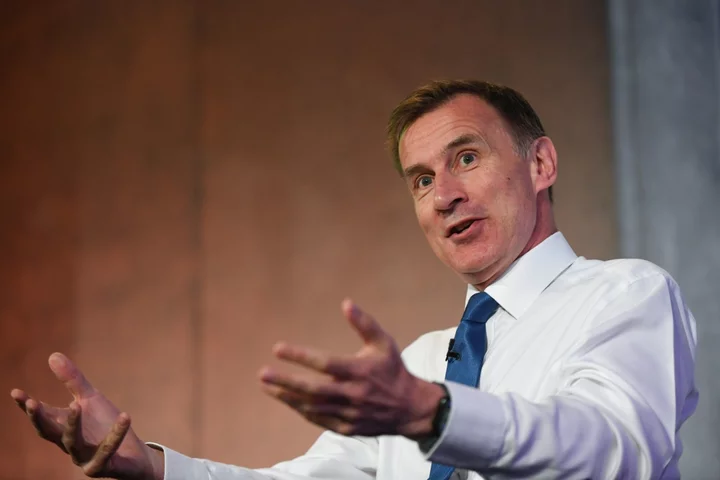The UK government announced an agreement between nine of Britain’s largest pension providers to boost their investment in growth companies, a move it said could unlock £50 billion ($64 billion) if the rest of the industry follows suit.
Aviva Plc, Legal & General Group Plc and M&G Plc are among the firms to have joined the compact, which commits them to allocating 5% of assets in their default funds to unlisted stocks by 2030, Chancellor of the Exchequer Jeremy Hunt said in the annual Mansion House address on Monday evening. The pact — first reported by Bloomberg last week — and other reforms could benefit pension savers to the tune of more than £1,000 per year once they have retired, Hunt said.
“We will deliver not just more competitive financial services but a more innovative economy,” Hunt said at the Square Mile’s most prestigious dinner, to an audience of 350 of the City’s top executives. The agreement will “boost returns and improve outcomes for pension fund holders whilst increasing funding liquidity for high-growth companies.”
In addition to the pensions deal, Hunt said he will progress plans to roll back parts of European Union legislation that forced financial firms to separate the cost of investment research from trading expenses, which was also first reported by Bloomberg.
The pensions agreement and capital market reforms are part of Hunt’s efforts to lift UK economic growth by spurring investment in innovative businesses. The chancellor is under pressure to show that Britain is open for business after a spate of corporate criticism about an unwelcoming environment for firms and policy inertia since the UK left the EU.
Read More: Britain Is Adrift, and the World’s Executives Are Alarmed
There’s an electoral pressure too: Britain’s governing Conservative Party has faced a double-digit poll deficit against the opposition Labour Party for months, with a general election due by January 2025. The UK is in the grip of a cost-of-living crisis and growth is anemic, which Hunt wants to fix.
“A strong economy needs a successful City,” Hunt said. “We can further improve the functioning of capital markets.”
Hunt’s pensions deal is the latest in a series of financial services reforms announced since he became chancellor, as he tries to find post-Brexit benefits for the City. Those plans have included relaxing ring-fencing capital rules and consulting on EU-era regulations concerning short-selling.
‘Turning Point’
The challenge is to offset some of the negative effects of Brexit, which has seen London’s financial industry lose some jobs and assets to the EU plus other finance centers like New York.
Hunt said the pensions compact will increase returns for savers and the initial signatories represent a majority of the defined-contribution pension market.
The reforms “mark a historic turning point that will accomplish the dual aim of securing a brighter future for retirees and channeling billions into our economy,” said Nicholas Lyons, the Lord Mayor of London, who helped organize the pact. It will “support firms to grow, stay and list in the UK,” he said.
Other signatories to the agreement include Scottish Widows, Aegon NV and Phoenix Group Holdings Plc.
The statement also announced other reforms aimed at the City, including:
- Winding up low-performing pension plans into larger, better-performing funds
- Consulting on doubling investments in private equity by local government pension funds to 10%, which could unlock £25 billion by 2030
- Simplifying investor prospectuses and creating an “intermittent trading venue” where private companies can access public markets without a full initial public offering.
Aside from low growth, high inflation is the other major economic problem Hunt is trying to address. BOE Governor Andrew Bailey, who also spoke at Mansion House, said inflation is likely to drop “markedly” this year and that the full impact of interest rate increases has yet to hit the economy.
For his part, Hunt said he would continue to exercise restraint with public sector pay awards.
“We will do what is necessary for as long as necessary to tackle inflation persistence and bring it back to the 2% target,” Hunt said. “There can be no sustainable growth without eliminating the inflation that deters investment and erodes consumer confidence.”
(Updates with Hunt remarks starting in second paragraph.)









